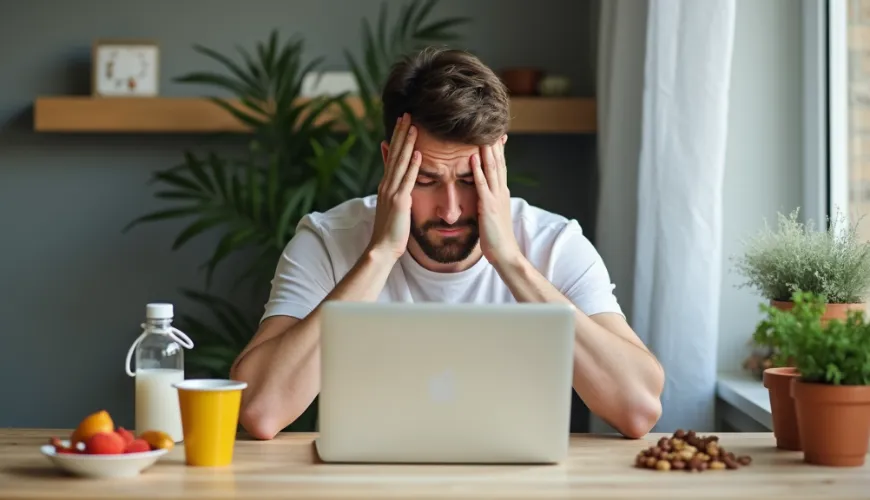
Loss of Libido in Men and How to Address It Without Embarrassment

What Causes a Decrease in Libido in Men and Why Does It Also Affect Younger Generations?
Sexual desire is a natural part of life. It is not just a physical need but also a signal of vitality, mental well-being, and healthy hormonal balance. However, when men's libido starts to fade, it often remains unspoken—shrouded in shame, insecurity, and fear of misunderstanding. Although loss of sexual desire is commonly associated with older age, it increasingly affects young men aged between 20 and 35.
The question then arises: why is the loss of libido in young men becoming a more frequent topic, and what could be behind it?
Libido as a Reflection of Overall Health
Sexual appetite is not an isolated bodily function. It reflects a complex interplay of hormonal balance, mental state, lifestyle, and the quality of a partner relationship. If any of these areas are not functioning optimally, libido is often the first to change. In younger men, a decrease in sexual desire is an even more sensitive signal—because at this age, the body is expected to be at the peak of its performance.
However, it is not uncommon for a man in his twenties or thirties to start losing interest in intimacy, not just physically but also emotionally. Initially, he might not be able to explain it and often trivializes it—fatigue, stress, occasional problems. But if the condition persists or repeats over a long period, it can negatively impact both his self-esteem and partner relationships.
What Causes Loss of Libido in Young Men?
There are several reasons, often overlapping. Sometimes it's a combination of physical, psychological, and social factors. Research shows that more and more young men experience a decrease in desire due to modern lifestyle. The most common causes include:
- Chronic stress and work overload – Exhaustion from work, constant availability via mobile phones, or performance pressure can lead to fatigue and reduced testosterone production.
- Lack of sleep – Sleep directly affects hormonal balance. Men who sleep less than 6 hours a day have demonstrably lower levels of testosterone.
- Poor diet and obesity – Excessive consumption of processed foods, sugar, and alcohol weakens circulation and reduces the production of sex hormones.
- Psychological factors – Anxiety, depression, low self-esteem, or body image issues can significantly suppress libido.
- Influence of pornography – Excessive watching of pornography can lead to "desensitization," reducing sensitivity to regular sexual stimuli and loss of interest in real sex.
- Hormonal imbalance – Even young men can suffer from low testosterone levels, one of the main hormones responsible for sexual desire.
In the specific case of twenty-nine-year-old David, an analyst from Prague, it was a combination of several factors. Long hours sitting at a computer, irregular routine, no exercise, and evening "switch-off" with streaming services. Initially, David thought it was the result of demanding work. But when he lost interest in intimacy with his partner after several months, he started addressing the issue. He sought professional help and changed his lifestyle—added exercise, adjusted his diet, limited alcohol, and started sleeping more. The effect appeared within a few weeks.
When to Pay Attention and What to Do?
A temporary decrease in libido is entirely normal—everyone has periods when they feel less energetic or under psychological pressure. However, if reduced sexual desire persists for more than a few weeks, it may signal a deeper problem. In such cases, it's worth considering what has changed in life.
The first step can be a reflection on lifestyle—what is the sleep, diet, attitude towards exercise, and mental health like? Sometimes small changes can have surprising effects. For example, just increasing the intake of zinc or vitamin D can positively affect testosterone production. Regular exercise, stress reduction, and more time for rest have a direct impact on hormonal balance.
If changes do not help or the problem is more pronounced, it is advisable to consult a specialist. A sexologist, andrologist, or psychologist can help identify the cause and propose specific solutions. In some cases, hormonal testing or psychotherapy may be necessary.
How to Boost Libido Naturally?
In today's fast-paced world, where stress comes at us from all sides, more and more people are looking for ways to support their libido without resorting to chemicals—and it makes sense. The natural way, specifically adaptogens, offers a gentler and more long-term solution that affects not only libido but also the overall balance of the body. For example, Peruvian maca is no longer just some exotic root from the Andes—people have used it for generations as a powerful aphrodisiac that helps with hormonal balance and adds vitality, all without side effects.
Then there's ginseng, a great natural energy booster—not only does it help with overall endurance, but it also improves circulation, which directly impacts libido. When it comes to stress, which is a common reason for disappearing desire, you can rely on ashwagandha, a herbal helper from India—its ability to calm the mind and relieve anxiety can help you tune back in.
Try our natural products
And if you are looking for something to kickstart natural testosterone production, tribulus terrestris is worth mentioning, having gained popularity mainly among men, but it often brings results to women as well. In short, nature has more up its sleeve than it might seem at first glance—you just need to know where to reach.
In addition to these herbs, changing daily habits can be very helpful. For example, reducing caffeine and alcohol, regular exercise (especially strength training), meditation, or breathing exercises. Building healthy relationships is also important—psychological intimacy often precedes physical intimacy.
A Topic That Is Not Talked About, But Should Be
Many young men suffer from decreased libido in silence. Instead of open conversation, they choose to escape—into work, sports, or the online world. Loss of sexual desire is not a shame or failure. It is a signal from the body that something is not in balance. Early recognition of the causes and willingness to make changes not only brings back desire but often leads to better relationships and a healthier lifestyle.
As British psychotherapist Alain de Botton said: "Sex is not just a desire for the body. It is also a desire to be seen, accepted, and feel alive." Perhaps therein lies the key: seeking lost desire not as an isolated problem but as part of the overall life story.
Whether it's a difficult period, a hormonal fluctuation, or just a signal that it's time to slow down, the good news is: libido can be restored if one listens to their body and soul in time.


